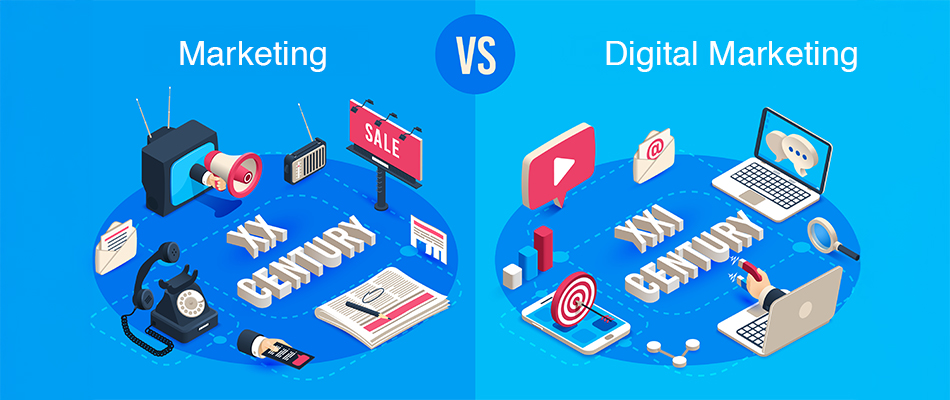Marketing and digital marketing are essential for anyone looking to build a successful career in the business world. These fields provide the knowledge and practical skills needed to create impactful campaigns, engage target audiences, and drive business growth. Students gain a comprehensive understanding of traditional marketing strategies, digital channels, content creation, SEO, social media, and analytics. By completing the programme, graduates are well-prepared to assume professional roles, lead digital campaigns, or specialise in niche areas.
Regenesys Business School provides programmes specifically designed to equip students with the practical knowledge and skills required to succeed in these fields. Their Postgraduate Diploma in Digital Marketing is a comprehensive three-year degree programme that prepares learners for a wide range of career opportunities in marketing, advertising, and digital communications.
This article explains the meaning of marketing and digital marketing, their pros and cons, key differences, essential tools, future trends, and how a Postgraduate Diploma in Digital Marketing at Regenesys equips students for high-demand careers.
Table of Contents
What is Digital Marketing?
Digital marketing is the process of promoting products, services, or brands using online platforms and digital technologies. It includes methods like social media marketing, search engine optimisation (SEO), email marketing, content marketing, and paid online advertisements. Businesses use digital marketing to reach potential customers where they spend most of their time, online, ensuring campaigns are targeted, cost-effective, and measurable.
Unlike traditional marketing, which relies on offline channels such as TV, radio, or print, digital marketing allows for real-time engagement with audiences. Companies can track user behaviour, analyse performance, and adjust strategies instantly, making campaigns more interactive and results-driven. This approach helps brands build stronger customer relationships, increase visibility, and achieve higher conversion rates.

What is Marketing?
Marketing is the process of promoting and selling products or services by understanding customer needs and creating value for them. It involves activities such as market research, advertising, branding, pricing, and distribution, all aimed at connecting a business with its target audience. Effective marketing ensures that the right product reaches the right people at the right time.
Beyond just selling, marketing focuses on building strong relationships with customers, enhancing brand awareness, and encouraging loyalty. By analysing customer behaviour and market trends, businesses can make informed decisions, tailor their offerings, and stay competitive in the market.
Pros and Cons of Traditional Marketing
Traditional marketing has been the backbone of business promotion for decades. It relies on offline methods to reach a broad audience, but measuring results and targeting specific groups can be challenging.
The pros and cons of marketing:
Pros:
- It helps build strong brand awareness among a broad audience.
- It reaches a broad audience through channels like TV, radio, and print.
- It is effective for local or offline campaigns where personal interaction matters.
Cons:
- Traditional marketing can be expensive, particularly when it comes to TV or print ads.
- Measuring results accurately is often tricky.
- It has a limited ability to target specific customer segments.
Traditional marketing provides broad exposure and brand recognition, but it lacks the precision and measurable outcomes that digital methods offer.
Also Read, PGDip in Digital Marketing: Practical Skills for the Modern Marketer
Pros and Cons of Digital Marketing
Digital marketing uses online platforms to promote products or services, allowing businesses to target specific audiences and measure results in real time. While highly efficient, it requires technical skills and faces intense online competition.
Regenesys Business School equips students with practical knowledge and hands-on skills in digital marketing, preparing them for high-demand roles in the industry.
The pros and cons of digital marketing:
Pros:
- Digital marketing is cost-effective and can be scaled easily.
- It enables businesses to reach and target specific audiences precisely.
- Campaign performance can be tracked and analysed in real time.
- It enables direct interaction and engagement with customers.
Cons:
- It requires technical skills to plan and manage campaigns effectively.
- There is high competition online, making it challenging to stand out.
- Organic results may take time to appear and require consistent effort.
- Businesses are dependent on internet access and online platform stability.
Digital marketing provides precise targeting, measurable results, and real-time engagement, making it highly effective for modern businesses, though it requires expertise and persistence.
Also read, Online vs Classroom PGDip Digital Marketing in SA
Difference Between Digital Marketing and Marketing
Digital marketing and traditional marketing differ in approach and reach. Traditional marketing uses offline channels like TV, radio, and print to target broad audiences. In contrast, digital marketing uses online platforms like social media and email to engage specific audiences with measurable results.
The table below shows the difference between Digital and Traditional marketing:
|
Aspect |
Digital Marketing |
Traditional Marketing |
|
Communication Channels |
Communicates with customers via emails, chats, social media, and other online platforms. |
Communicates with customers through various channels, including mobile numbers, newspapers, banners, posters, and other offline media. |
|
Target Audience |
The targeted audience can be reached in one place, with precise targeting of specific users. |
The targeted audience is scattered, with less precise targeting. |
|
Cost |
Less expensive compared to traditional marketing. |
High marketing cost. |
|
Effectiveness |
More effective in engaging and converting audiences. |
Less effective. |
|
Flexibility |
Quick and easier to modify campaigns based on performance and feedback. |
Hard to modify once launched. |
Digital marketing offers more cost-effective, precise, and flexible ways to reach and engage audiences compared to traditional marketing, making it a crucial strategy for modern businesses.

Essential Marketing Tools and Future Trends
Marketing today relies heavily on a variety of tools and platforms to reach and engage audiences effectively. Businesses use social media platforms like Facebook, Instagram, LinkedIn, and YouTube, along with SEO and analytics tools such as Google Analytics and SEMrush, to plan, track, and optimise campaigns. Email marketing tools like Mailchimp and HubSpot also help maintain direct communication with customers.
Looking ahead, the future of marketing is shaped by technology and innovation. Integration of digital and traditional methods, data-driven strategies, and emerging technologies like AI, automation, and AR/VR are transforming how brands interact with audiences. Marketers who master these tools and stay updated with trends will be better equipped to create personalised, impactful campaigns.
Key points:
- Social media platforms, SEO, and email marketing tools are essential for effective campaigns.
- Data-driven strategies and analytics improve decision-making and ROI.
- AI, automation, and emerging technologies like AR/VR are shaping the future of marketing.
- Combining traditional and digital methods enhances reach and engagement.
Mastering modern marketing tools and understanding future trends through a Postgraduate Diploma in Digital Marketing from Regenesys is essential for staying competitive and delivering campaigns that genuinely resonate with audiences.

Conclusion
Marketing and digital marketing are vital for building successful businesses and careers in a competitive landscape. While traditional marketing helps create broad brand awareness, digital marketing offers precise targeting, measurable results, and real-time engagement. By understanding the differences, pros and cons, essential tools, and emerging trends, students and professionals can make informed decisions and stay ahead in the industry. Programmes like the PGDDM at Regenesys equip learners with the practical skills and knowledge needed to lead impactful campaigns and thrive in high-demand roles, ensuring they are well-prepared for the future of marketing.
Apply now with Regenesys Education and begin your Postgraduate Diploma in Digital Marketing journey today.
Difference between Marketing and Digital Marketing – FAQ
What is digital marketing?
Digital marketing is the promotion of products or services using online platforms like social media, SEO, and email. It enables targeted campaigns, real-time engagement, and measurable results.
How is digital marketing different from traditional marketing?
Traditional marketing uses offline channels like TV and print for a broad reach, while digital marketing targets specific audiences online with measurable outcomes.
Why is learning digital marketing important?
It equips students with skills to create effective campaigns, engage audiences, and pursue high-demand roles in marketing and digital communications.
What tools are essential in modern marketing?
Key tools include social media platforms, SEO and analytics software, and email marketing platforms, which help plan, track, and optimise campaigns.
What career opportunities are available after a Postgraduate Diploma in Digital Marketing?
Graduates can work as Digital Marketing Manager, SEO Analyst, Social Media Manager, or Content Marketing Manager, leading campaigns and driving business growth.







